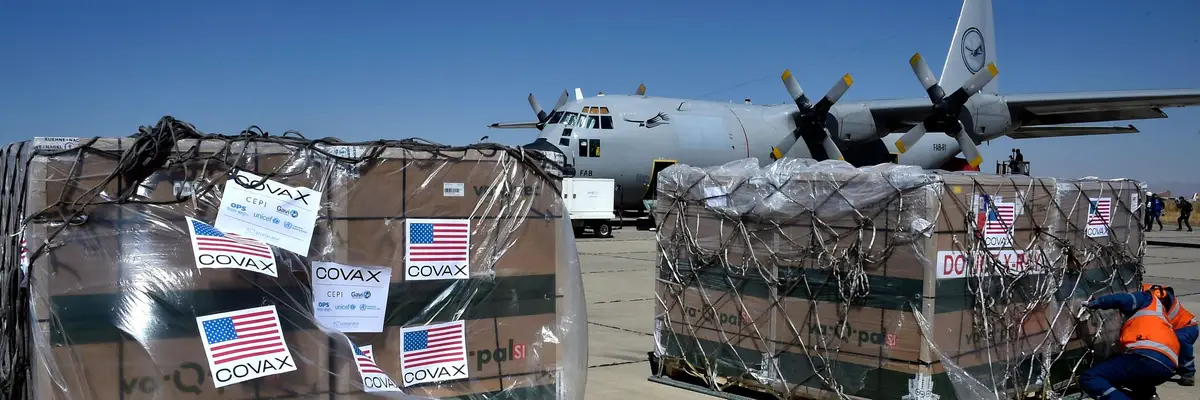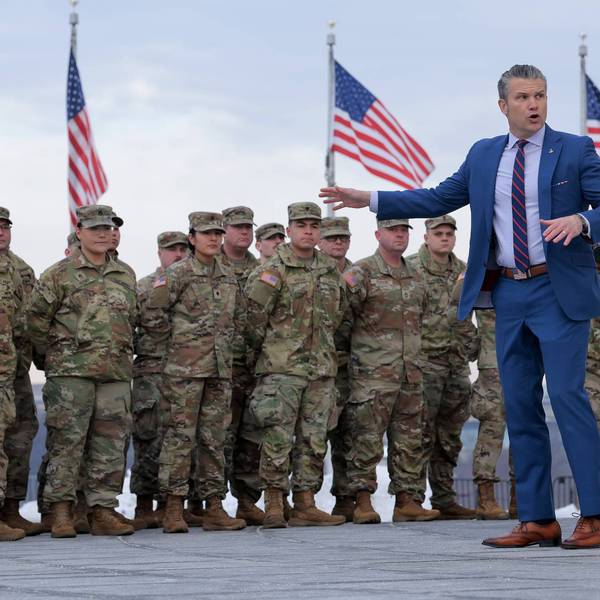
A shipment of more than one million doses of Johnson & Johnson Covid-19 vaccines donated through COVAX arrive at an air force base in El Alto, Bolivia, on July 11, 2021. (Photo: Aizar Raldes/AFP via Getty Images)
The Pentagon Just Got $778 Billion, But USAID Is Running Out of Money for Covid-19 Vaccines?
"Why is there more money for the military-industrial complex… at the same time the U.S. is refusing to spend the $25 billion needed to make enough additional vaccines to vaccinate the world?"
Sharply contrasting with the $778 billion in new military spending authorized Monday by President Joe Biden, the U.S. Agency for International Development reportedly can't find the funds to pay for the Biden administration's effort to help vaccinate the world's population against Covid-19, according to two agency officials interviewed by Politico.
In an article published Monday by the website, a pair of unnamed sources at USAID--the main goverment agency in charge of distributing coronavirus vaccine doses to COVAX, the global vaccine equity program--are concerned that efforts could stall in the coming spring should the administration fail to find new funding sources.
According to Politico:
The agency, which works with officials in the State Department, has over the past year largely relied on more than $1.6 billion allocated through the American Rescue Plan to help facilitate the shipment and administration of Covid-19 vaccine doses internationally. The agency has either used that money or already earmarked it for several months into the new year to help countries prepare to receive and distribute the doses, the officials said.
Without additional funding, the officials said that USAID will fall behind in its commitments to help the Biden administration distribute hundreds of millions of U.S.-made doses to low- and middle-income countries by the middle of 2022. At the administration's first Covid-19 summit with foreign representatives in September, U.S. officials noted it would take at least $7 billion in 2022 to ensure shots are administered across the globe.
Stephen Semler, co-founder of Security Policy Reform Institute, a grassroots-funded think tank, tweeted Monday that in 2021, Biden "delivered 8% of the funding he campaigned on for physical and human infrastructure, and 105% of the amount he ran on for the Pentagon."
Critics have noted that the $778 National Defense Authorization Act approved by Congress is $25 billion more than Biden requested--and more than enough to vaccinate everyone in the world.
"Why is there more money for the military-industrial complex--providing no additional protection for our national security and arguably diminishing it--at the same time the U.S. is refusing to spend the $25 billion needed to make enough additional vaccines to vaccinate the world?" recently asked Public Citizen president Robert Weissman earlier this month, citing the consumer advocacy group's analysis of how much it would take to inoculate humanity.
According to Politico, it is unclear how USAID--which, in addition to providing developmental assistance, has been accused of democracy suppression, torture, and murder--will obtain fresh funding for the U.S. vaccine distribution efforts. The two officials said the agency is "exploring options, including dipping into existing pots of money used for other USAID programs."
Global South leaders have regularly decried vaccine inequities, with some linking the shortfalls with ever-increasing military spending.
At September's United Nations General Assembly, Cuban President Miguel Diaz-Canel Bermudez noted that 80% of doses had been distributed to middle- or high-income nations, comparing that statistic to the nearly $2 trillion in global military spending--more than one-third of it by the United States.
"How many lives would have been saved," asked Diaz-Canel, "[if] those resources had been invested in health or the manufacturing and distribution of vaccines?"
An Urgent Message From Our Co-Founder
Dear Common Dreams reader, The U.S. is on a fast track to authoritarianism like nothing I've ever seen. Meanwhile, corporate news outlets are utterly capitulating to Trump, twisting their coverage to avoid drawing his ire while lining up to stuff cash in his pockets. That's why I believe that Common Dreams is doing the best and most consequential reporting that we've ever done. Our small but mighty team is a progressive reporting powerhouse, covering the news every day that the corporate media never will. Our mission has always been simple: To inform. To inspire. And to ignite change for the common good. Now here's the key piece that I want all our readers to understand: None of this would be possible without your financial support. That's not just some fundraising cliche. It's the absolute and literal truth. We don't accept corporate advertising and never will. We don't have a paywall because we don't think people should be blocked from critical news based on their ability to pay. Everything we do is funded by the donations of readers like you. Will you donate now to help power the nonprofit, independent reporting of Common Dreams? Thank you for being a vital member of our community. Together, we can keep independent journalism alive when it’s needed most. - Craig Brown, Co-founder |
Sharply contrasting with the $778 billion in new military spending authorized Monday by President Joe Biden, the U.S. Agency for International Development reportedly can't find the funds to pay for the Biden administration's effort to help vaccinate the world's population against Covid-19, according to two agency officials interviewed by Politico.
In an article published Monday by the website, a pair of unnamed sources at USAID--the main goverment agency in charge of distributing coronavirus vaccine doses to COVAX, the global vaccine equity program--are concerned that efforts could stall in the coming spring should the administration fail to find new funding sources.
According to Politico:
The agency, which works with officials in the State Department, has over the past year largely relied on more than $1.6 billion allocated through the American Rescue Plan to help facilitate the shipment and administration of Covid-19 vaccine doses internationally. The agency has either used that money or already earmarked it for several months into the new year to help countries prepare to receive and distribute the doses, the officials said.
Without additional funding, the officials said that USAID will fall behind in its commitments to help the Biden administration distribute hundreds of millions of U.S.-made doses to low- and middle-income countries by the middle of 2022. At the administration's first Covid-19 summit with foreign representatives in September, U.S. officials noted it would take at least $7 billion in 2022 to ensure shots are administered across the globe.
Stephen Semler, co-founder of Security Policy Reform Institute, a grassroots-funded think tank, tweeted Monday that in 2021, Biden "delivered 8% of the funding he campaigned on for physical and human infrastructure, and 105% of the amount he ran on for the Pentagon."
Critics have noted that the $778 National Defense Authorization Act approved by Congress is $25 billion more than Biden requested--and more than enough to vaccinate everyone in the world.
"Why is there more money for the military-industrial complex--providing no additional protection for our national security and arguably diminishing it--at the same time the U.S. is refusing to spend the $25 billion needed to make enough additional vaccines to vaccinate the world?" recently asked Public Citizen president Robert Weissman earlier this month, citing the consumer advocacy group's analysis of how much it would take to inoculate humanity.
According to Politico, it is unclear how USAID--which, in addition to providing developmental assistance, has been accused of democracy suppression, torture, and murder--will obtain fresh funding for the U.S. vaccine distribution efforts. The two officials said the agency is "exploring options, including dipping into existing pots of money used for other USAID programs."
Global South leaders have regularly decried vaccine inequities, with some linking the shortfalls with ever-increasing military spending.
At September's United Nations General Assembly, Cuban President Miguel Diaz-Canel Bermudez noted that 80% of doses had been distributed to middle- or high-income nations, comparing that statistic to the nearly $2 trillion in global military spending--more than one-third of it by the United States.
"How many lives would have been saved," asked Diaz-Canel, "[if] those resources had been invested in health or the manufacturing and distribution of vaccines?"
Sharply contrasting with the $778 billion in new military spending authorized Monday by President Joe Biden, the U.S. Agency for International Development reportedly can't find the funds to pay for the Biden administration's effort to help vaccinate the world's population against Covid-19, according to two agency officials interviewed by Politico.
In an article published Monday by the website, a pair of unnamed sources at USAID--the main goverment agency in charge of distributing coronavirus vaccine doses to COVAX, the global vaccine equity program--are concerned that efforts could stall in the coming spring should the administration fail to find new funding sources.
According to Politico:
The agency, which works with officials in the State Department, has over the past year largely relied on more than $1.6 billion allocated through the American Rescue Plan to help facilitate the shipment and administration of Covid-19 vaccine doses internationally. The agency has either used that money or already earmarked it for several months into the new year to help countries prepare to receive and distribute the doses, the officials said.
Without additional funding, the officials said that USAID will fall behind in its commitments to help the Biden administration distribute hundreds of millions of U.S.-made doses to low- and middle-income countries by the middle of 2022. At the administration's first Covid-19 summit with foreign representatives in September, U.S. officials noted it would take at least $7 billion in 2022 to ensure shots are administered across the globe.
Stephen Semler, co-founder of Security Policy Reform Institute, a grassroots-funded think tank, tweeted Monday that in 2021, Biden "delivered 8% of the funding he campaigned on for physical and human infrastructure, and 105% of the amount he ran on for the Pentagon."
Critics have noted that the $778 National Defense Authorization Act approved by Congress is $25 billion more than Biden requested--and more than enough to vaccinate everyone in the world.
"Why is there more money for the military-industrial complex--providing no additional protection for our national security and arguably diminishing it--at the same time the U.S. is refusing to spend the $25 billion needed to make enough additional vaccines to vaccinate the world?" recently asked Public Citizen president Robert Weissman earlier this month, citing the consumer advocacy group's analysis of how much it would take to inoculate humanity.
According to Politico, it is unclear how USAID--which, in addition to providing developmental assistance, has been accused of democracy suppression, torture, and murder--will obtain fresh funding for the U.S. vaccine distribution efforts. The two officials said the agency is "exploring options, including dipping into existing pots of money used for other USAID programs."
Global South leaders have regularly decried vaccine inequities, with some linking the shortfalls with ever-increasing military spending.
At September's United Nations General Assembly, Cuban President Miguel Diaz-Canel Bermudez noted that 80% of doses had been distributed to middle- or high-income nations, comparing that statistic to the nearly $2 trillion in global military spending--more than one-third of it by the United States.
"How many lives would have been saved," asked Diaz-Canel, "[if] those resources had been invested in health or the manufacturing and distribution of vaccines?"

